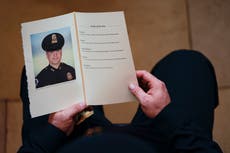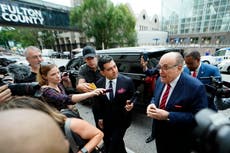Trump’s defamation lawsuit claims CNN tried to ‘sabotage’ campaign with comparisons to Hitler and Nazism
In a filing that pushes for a rewrite of landmark First Amendment protections, ex-president’s lawyers suggest journalists are ‘an enemy of democracy’
Donald Trump’s defamation lawsuit against CNN accuses the network of baselessly comparing the former president and his Make America Great Again movement to the rise of Nazism in 1930s Germany.
But the former president’s lawyers have unironically suggested in a recent filing that journalists are “an enemy of democracy” and invited the courts to strip First Amendment protections by revisiting landmark precedent in a decades-old US Supreme Court case, with Mr Trump’s lawsuit providing a “perfect vehicle” to tear it down.
The lawsuit also suggests that the network is responsible for the “rise of disinformation” without addressing Mr Trump’s own wave of bogus claims, including the so-called “big lie” baselessly alleging a conspiracy theory to steal the 2020 presidential election from him, a phrase that is central to his battle with the news network.
A 20-page filing on 30 December in response to CNN’s attempts to dismiss the suit mentions Adolf Hitler more than two dozen times – including several instances where his name is misspelled “Adolph” – and “Nazi” is mentioned 21 times in a document underscoring the former president’s vitriol towards journalists and news media.
The latest memo in the $475m defamation suit, first reported by The Daily Beast, accuses the network of intentionally invoking Hitler and Nazism to ensure his political defeat when describing his far-right antidemocratic agenda. The network “knowingly chose to sabotage a presidential candidate with the most odious, untrue personal comparison imaginable,” according to the filing on 30 December.
“CNN anchors have explicitly stated on air that the term ‘Big Lie’ refers to Nazi propaganda, utilized by Adolph Hitler [sic],” Mr Trump’s lawyers wrote in the latest filing. “Similarly, CNN programming has used the term the ‘Big Lie’ while simultaneously displaying imagery of Adolph Hitler [sic] and the Nazis. Under these circumstances, the correlation between the ‘Big Lie’ and Nazism is unmistakable.”
The filing claims that the network ignores the “irrefutable truth” that Mr Trump “believed and continues to believe, with solid factual support, that the 2020 election had material irregularities,” which has not been substantiated in any courts or by state and federal officials or elections administrators across the US, or by allegations in election lawsuits that were roundly rejected in the aftermath of the 2020 election.
The filing points to a database from far-right legal group the Heritage Foundation and a controversial case before the US Supreme Court that advances the so-called “independent state legislature” theory to defend Mr Trump’s statements about election fraud.
Mr Trump’s lawyers allege that the network acted with “actual malice” or with “reckless disregard” by publishing such statements, which they claim caused him “reputational harm”.
A ruling in the case of New York Times v Sullivan in 1964 broadly affirms First Amendment protections that limit the ability of public officials to sue for defamation by using the “actual malice” standard. But Mr Trump’s lawyers say the precedent “no longer merely provides ‘breathing space’ for the occasional misstatement, but rather, offers a nearly impenetrable shield to the media, allowing it to publish defamatory statements targeting political enemies, without fear of consequence.”
“This has led to a lack of public confidence in the media, and in the absence of serious self-correction the courts are in a critically important position to reign in the reckless disregard for the truth that has flourished under Sullivan’s impact,” they wrote.
For years, the former president has derided journalists as “enemy of the people” and used the term “fake news” – itself an echo of the “lying press” pejorative used by Nazis – more than 2,000 times while in office in attempts to undermine allegations against him.
Following the introduction of his lawsuit, Mr Trump has come under federal investigation for his role during and leading up to the attack on the US Capitol on 6 January, 2021, which was fuelled by his baseless narrative that the 2020 election was stolen from him and rigged against him, and has publicly suggested that such claims would allow for the “termination” of the Constitution.
His legal allies and right-wing media outlets also are facing their own sweeping defamation lawsuit from Dominion Voting Systems after amplifying false claims about its machines after the 2020 election.
But his lawyers insist that their case against CNN “does not attack Constitutional principles or thwart legitimate political discourse” as the former president launches his bid for the 2024 Republican nomination for president.
“Some [of] CNN’s audience members have been unjustly led to believe that plaintiff literally is a fascist leader,” according to their filing. “CNN’s statements seriously attempt to falsely state that the plaintiff intentionally used a Nazi-like propaganda technique to preserve his political power.”
They add in a footnote that “there is no case law requiring a plaintiff to plead facts that show why a false statement is, in fact, false.”
Join our commenting forum
Join thought-provoking conversations, follow other Independent readers and see their replies
Comments




Bookmark popover
Removed from bookmarks